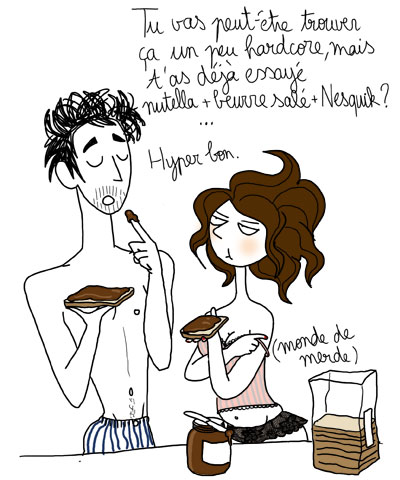
People back home often ask about my experience transitioning to expat life in France. As promised, here’s an excerpt from my interview with Aux Cinq Coins du Monde, with some completely honest answers. I’ve translated the text to English, but you can read the original article in French here.
What do you like about your host country?
I love that the French enjoy a relaxed lifestyle. Stores close super early, which means that the evening for relaxatino and appreciating a good meal. Many families here have lived in the same town for generations, and know their neighbors and local businesses. France has a rich history dating back thousands of years. The culture and climate of each region is very distinct, and France is very accessible for trips to other European countries.
The climate here is also pretty great – it never gets too hot or too cold between seasons, so the view stays green all year round. I’m originally from Boston, where each season is very distinct. It’s easier here, but I miss snow and hot summers!
What do you dislike ?
I grew up in a matriarcal family. Here in our corner of France, the roles of men and women are still pretty rigid. When we are invited to people’s homes, women generally cook and clean, while men generally repair things and drink. Difficult to avoid speaking out and insulting people ! I also miss local beers, and international dining options.
What are some characteristics of your host country ?
I can never stop raving about French food! I love the wine, trying meals with rabbit and duck meat, galettes, and plenty of the traditional desserts. There are many farms in the area where we can buy local food directly, which is a great advantage that most people don’t have in the US.
I guess my only complaint would be that people tend to eat a lot of meat and cheese here, without too many vegetables. For example, in the summer, people enjoy grilled meats with potatoes, and in the winter, it’s raclette.
French restaurants are delicious, but there aren’t too many international restaurant options here. I also miss New England specialties like apple cider, pumpkin foods, and seafood (lobster, clam chowder, and fried clams). And iced coffee ! But honestly, I can’t complain here – we eat very well !
In the US, the standard vacation time offered by employers is two weeks. Here, I have a minimum of 5 weeks! I use them to visit my family and travel. It’s very easy to travel on the weekends here. We’ve already visited the Mont St. Michel, La Baule, and the Puy du Fou. We’re planning to visit Normandie and Paris. It’s also possible to travel by car or train to Belgium, Germany, England, Switzerland, etc.
All of my experiences with the French healthcare system have been very good. I don’t have the carte vitale (French social security card) yet, but a typical consultation with a doctor, dentist, or vet will cost about 25€. There’s no need to make an appointment (except for specialists), you see the doctor directly (no assistants) and they are very laid-back and attentive.
If I want to drive in France, I will need to re-take a driving exam, because a MA state licence is not accepted here, and learn to drive manual. For now, I’ve been getting around by bike. But I love that most traffic lights here have been replaced with small rotary/roundabout so that traffic moves more fluidly.
More expensive in France : gas, highway tolls, food, restaurants (but there’s no need to tip), bank fees, taxes, and clothing.
Less expensive in France : healthcare and medication, wine and liquor (especially in restaurants), rent, and insurance rates (car/home/health).
Salaries tend to be lower overall in France than in the US.
Has your integration been easy ?
My boyfriend, my language ability, and my previous experiences in France have really helped me feel at home here. But with my accent and “weird” American habits, I will always be considered a foreigner here! People have made fun of the way I eat pizza and certain clothing choices.
It’s been difficult to meet locals in France. Most people aleady have close friends, and though everyone is very polite, it is difficult to integrate into a new group. So most of the people I hang out with include my boyfriend’s friends/family, colleagues, and other expats.

How often do you visit your home country ?
Over the past year I’ve lived in France, I had the opportunity to return to the US three times. Once for a wedding and my sister’s graduation, once for work, and once for Christmas. Visiting my family is a big priority for me, and I have plenty of vacation time, but the plane tickets are expensive! I use social media (Facebook, WhatsApp, Snapchat, Skype, Google chat) to contact family and friends as often as possible. I also have a landline that I can use to call any US number for free.
Do you intend to return to your home country one day ?
My boyfriend and I decided long before the move that we wanted to permanently live in the US one day. We are both very close with our families, but I think we would still prefer to live in a country with more career opportunities for both of us. So we intend to settle down on the East coast of the US within the next couple of years.
Do you want to share an anecdote ?
Last summer, we took a weekend trip to the beach. We visited La Baule, and I remember that we discussed the cultural differences between France and the US, that we never see American women topless on the beach, especially not with their families ! But in France, it’s completely normal. The next day, we decided to visit the medieval village Guerande and the neighboring salt flats. Afterwards, we saw signs for a beach not too far away. We parked the car and followed a long path through a forest. When we finally arrived at the beach, hot and ready to go for a swim, we realized that we were surrounded by naked people ! There had been no sign, no indication that this was a nudist beach! We immedately turned around and headed back to the car.
Do you have any advice for future expats ?
Thoroughly research your new life before you leave ! Expatriation is a fantastic experience, but there are many challenges. It is difficult to integrate without some knowledge of the language and culture of your host country, and it is often difficult to obtain visas and employment. Best of luck!

I’d like to thank Sara from Aux Cinq Coins du Monde for reaching out! For other expats who may be interested, the site is always looking for more francophones to share their experiences.

















Written
on February 19, 2014